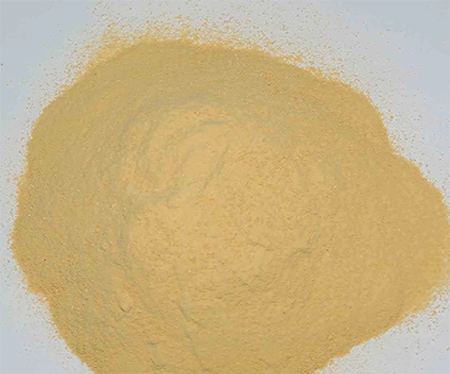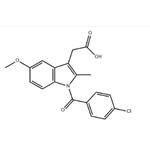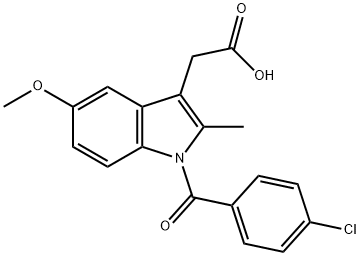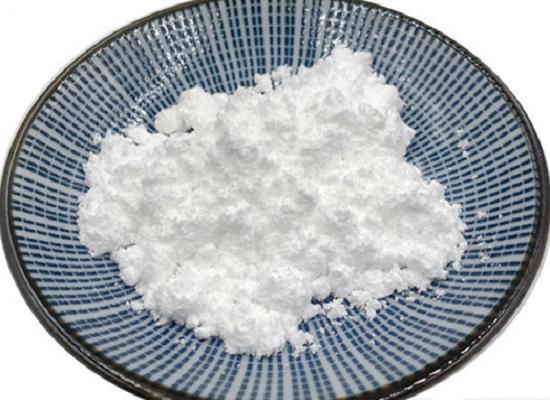Pharmacological effects of indomethacin
Background
Indomethacin is suitable for antipyretic and inflammatory pain relief[1], so it can be used for acute and chronic rheumatoid arthritis, gouty arthritis and cancer pain (western medicine carcinoid pain medicine, it can also be used for bursitis, tenosynovitis and Capsulitis, etc.; it can resist platelet aggregation, so it can prevent thrombosis, but its efficacy is not as good as acetylsalicylic acid; it has a good antipyretic effect in the treatment of Behcet syndrome; it is especially effective in Batter syndrome; it is used for biliary colic, It is effective for colic caused by ureteral stones; it is also effective for migraine headaches and can also be used for menstrual pain.
Indomethacin is a white or slightly yellow crystalline powder. Indomethacin is almost tasteless and odorless. Indomethacin is soluble in acetone, slightly soluble in ethanol, ether, chloroform and methanol, slightly soluble in benzene, very slightly soluble in toluene, and almost insoluble in water. Indomethacin is soluble in sodium hydroxide solution.

Picture 1 Indomethacin powder
Pharmacological effects of indomethacin
Long-term combined use of indomethacin and acetaminophen may increase renal toxicity[2]. The incidence of peptic ulcer is increased when combined with other non-steroidal anti-inflammatory drugs. The simultaneous application of indomethacin and aspirin or other salicylates cannot increase the curative effect, but the gastrointestinal side effects are significantly increased, and the bleeding tendency can be increased. Drinking alcohol while using indomethacin, or using indomethacin together with corticosteroids and adrenocorticotropic hormones can increase the tendency of gastrointestinal ulcers or bleeding. When indomethacin is combined with heparin, oral anticoagulants, and thrombolytics, there is a potential risk of increasing bleeding tendency. Indomethacin in combination with triamterene can cause gastric hypofunction. Indomethacin in combination with colchicine and sulfinpyrazone can increase the risk of gastrointestinal ulcers and bleeding.
Cautions
1. Avoid taking indomethacin with fruit juice or refreshing beverage: the fruit acid of fruit juice or refreshing beverage can easily cause the drug to decompose or dissolve in advance, which is not conducive to the absorption of the drug in the small intestine, and greatly reduces the efficacy of the drug, and indomethacin is originally on the gastric mucosa. It has a stimulating effect, and fruit acid can aggravate the stimulation of the stomach wall, and even cause gastric mucosal bleeding.
2. Do not take indomethacin before and after drinking: alcohol can increase gastric acid secretion, and both can accelerate gastric mucosal blood flow. If combined, it can aggravate gastric mucosal damage and cause gastric bleeding.
3. Take Indomethacin and avoid eating acidic foods: because Indomethacin is an organic acid drug, it has a direct stimulating effect on the gastric mucosa. Taking it with acidic foods (vinegar, sauerkraut, pickles, fish, hawthorn, bayberry, etc.) Stomach irritation.
4. Indomethacin should not be taken before meals: Indomethacin has a stimulating effect on the gastric mucosa. If taken on an empty stomach before meals, the drug directly contacts the gastric mucosa, which can aggravate gastrointestinal reactions, so it should be taken after meals.
5. Avoid taking indomethacin with tea: because tea contains tannic acid, caffeine and theophylline and other ingredients, caffeine can promote the secretion of gastric acid, which can aggravate the damage of indomethacin to the stomach.
Allergic reaction
After taking the medicine, it can cause numbness around the mouth, tongue and limbs, sudden heartache, headache, nausea, poor language, tremors, loss of self-control, and even fainting. Systemic angioedema and rash occur in some cases. There are also patients with asthma-like attacks. Therefore, patients with allergies and asthma should not use indomethacin. Allergic reactions occur more than 1 to 2 hours after taking the medicine, and some are up to 3 days.
Digestive system
Indomethacin has obvious stimulating and ulcer-inducing effects on the gastrointestinal tract, and has the risk of causing gastrointestinal mucosal erosion and ulcer bleeding. In addition to the direct stimulation of drugs, the mechanism of occurrence is that indomethacin inhibits the synthesis of the prostate, and the gastric mucosal barrier is damaged, resulting in inflammation, necrosis and ulcers of the mucosa. Therefore, people with a history of stomach and intestinal diseases should not take indomethacin. For patients who need to use indomethacin for a long time, fecal occult blood test should be performed regularly. In addition, indomethacin can also cause temporary jaundice and elevated transaminases, but to a lesser extent.
Circulatory system
Indomethacin can reduce the antihypertensive effect of furosemide and other diuretics, and can offset the antihypertensive effect of propranolol, thereby increasing blood pressure. In addition, because indomethacin can significantly inhibit the synthesis of prostaglandins and can make the fetal ductus arteriosus closed in advance, it is not suitable for women with hypertension and pregnancy.
Blood system
Indomethacin has an inhibitory effect on the function of the hematopoietic system, which can induce agranulocytosis and aplastic anemia; it can cause the decrease of platelets and affect the function of platelets and lead to bleeding. In addition, indomethacin can produce hemolytic anemia through autoimmunity. Those with bleeding tendencies are prohibited.
Urinary system
Some people use indomethacin to treat chronic glomerulonephritis, and the result is that the urine protein increases and the facial edema increases, and the symptoms improve after a few days of drug withdrawal. Neonatal treatment with high-dose indomethacin can cause mild renal insufficiency, manifested as decreased urine output and transient elevation of serum creatinine. Therefore, most scholars believe that it should be used with caution in patients with impaired renal function.
Nervous system
Forehead headache, dizziness, individual agitation, rigidity of limbs, speech disorder, endless crying and laughing, difficulty opening eyes and mouth and other mental disorders. improved after stopping the drug.
Others
There may be tinnitus, deafness, corneal opacity, eye movement disorder, diplopia, which disappear after stopping the drug, and can lead to infertility or delayed delivery of reproductive women and increased complications of premature babies.
Reference
1 National Pharmacopoeia Commission. Pharmacopoeia of the People's Republic of China: Instructions for Clinical Use of Drugs: Chemical Drugs and Biological Products. 2015 Edition. Beijing: China Medical Science and Technology Press, 2017.
2 National Pharmacopoeia Commission. Pharmacopoeia of the People's Republic of China. 2015 Edition. Beijing: China Pharmaceutical Science and Technology Press, 2015.
You may like
Related articles And Qustion
Lastest Price from Indometacin manufacturers

US $1.00-4.00/KG2025-09-11
- CAS:
- 53-86-1
- Min. Order:
- 1KG
- Purity:
- 99%
- Supply Ability:
- 200000KG

US $5.00-0.50/KG2025-05-07
- CAS:
- 53-86-1
- Min. Order:
- 1KG
- Purity:
- 99% hplc
- Supply Ability:
- 500TONS



